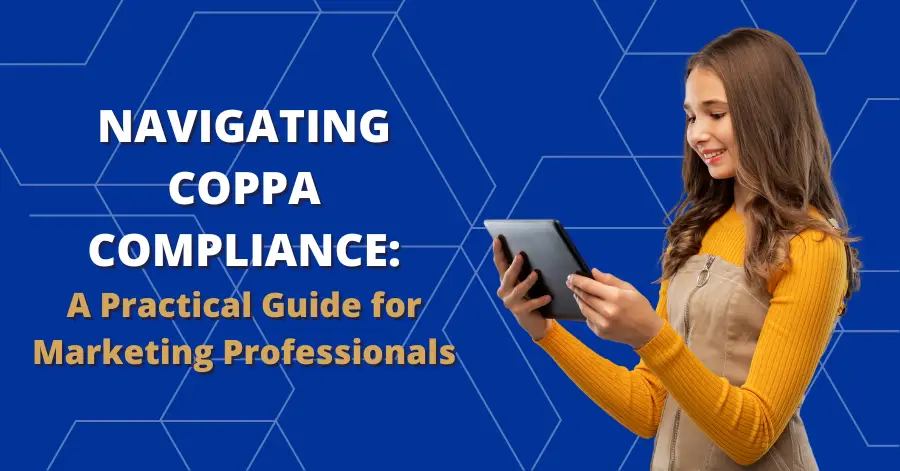Navigating COPPA Compliance: A Practical Guide for Marketing Professionals


The recent surge of data privacy laws shows an increased awareness of online privacy risks. But the conversation about children’s online privacy long predates even the GDPR.
The Children’s Online Privacy Protection Act (COPPA) was passed in 1998 and entered full effect in 2000. The law requires businesses to adhere to very strict and specific rules when collecting, using, or disclosing personal information from children under the age of 13. Non-compliance with COPPA can lead to substantial fines and legal repercussions. Much like the GDPR, enforcement of these requirements is taken very seriously. Marketing professionals absolutely need to understand the law’s implications and how to navigate them effectively.
What Is COPPA & Why Is It Important?
Simply put, COPPA was designed to give parents more direct control over what information companies can collect about their children online. It applies to websites, mobile apps, online services, and other digital platforms that target children under 13 or have actual knowledge that they collect information from children. The Federal Trade Commission enforces this law, and failure to comply can result in hefty fines.
For marketers, understanding COPPA is crucial, especially if your target audience includes children or if you operate on platforms where children may be present. Compliance is not just a legal obligation. It’s a matter of ethical responsibility to protect vulnerable users.
Key Requirements of COPPA
COPPA sets out a clear framework for businesses to follow:
- Notice and disclosure: Organizations must provide a clear and comprehensive privacy policy describing their information practices regarding children’s data. This policy must outline what data is collected, how it’s used, and with whom it’s shared.
- Parental consent: Before collecting personal information from children under 13, businesses must obtain verifiable parental consent. This might involve requiring parents to sign a consent form, use a credit card, or verify their identity through various secure means.
- Data minimization: Only collect the data necessary for the activity or service being provided. Avoid collecting extraneous information, as it increases risk and could lead to compliance issues.
- Access and deletion rights: Parents have the right to review the information collected from their children, request changes, or ask for the data to be deleted. Businesses must provide a mechanism for parents to exercise these rights.
- Confidentiality and security: Implement robust measures to protect the collected data. This includes maintaining the confidentiality, security, and integrity of personal information.
- Data retention and deletion: Retain children’s data only as long as necessary for the purpose for which it was collected and securely delete it afterward.

6 Steps to COPPA Compliance
To help marketing professionals navigate COPPA requirements effectively, the FTC offers a 6-step compliance plan:
- Determine if your business is covered by COPPA: Review your audience and data collection practices. If your website, app, or service is directed toward children under 13, or you have actual knowledge of collecting data from this age group, COPPA applies to you.
- Post a comprehensive privacy policy: Ensure your privacy policy is prominently displayed and clearly describes your data collection, usage, and disclosure practices. This policy should be easily understandable to both children and parents.
- Notify parents before collecting data: Before collecting any personal information on users under 13, inform their parents that you will be doing so. Explain how you collect the data, what you’re collecting, and how you’ll use it.
- Obtain verifiable parental consent: This step may involve sending parents a direct notice explaining your data practices and requiring a consent form, credit card verification, or other approved methods. 4Comply’s streamlined consent management system makes this easy.
- Honor parents’ ongoing rights: Once a parent has provided consent, they must have the ability to review, change, or delete their child’s personal information. Create a straightforward process for parents to exercise these rights. Using 4Comply to manage ongoing DSARs will ensure that parents can access their child’s data at any time.
- Implement security measures: Protect children’s personal information using secure data storage methods, encryption, and regular security audits. Ensuring confidentiality and data integrity is non-negotiable.
COPPA is subject to regulatory changes, so it’s important to regularly review your policies and practices to ensure ongoing compliance. Stay informed about updates to COPPA requirements and adjust your strategies accordingly. 4Comply will help you stay up to date on anything new.
Best Practices for Marketing Professionals
Maintaining COPPA compliance requires vigilance and a commitment to ethical data handling. For your marketing team, the most important things to remember include:
- Practice data minimization: Collect only the information that is necessary for your service or product. Avoid gathering sensitive data that isn’t essential, as this can minimize risk and make compliance easier.
- Use age-screening mechanisms: Implement age-gating techniques, such as asking for a date of birth before collecting any data. This can help prevent inadvertent data collection from children under 13. Never encourage children to lie about their age online.
- Train your team: Educate your marketing, customer service, and IT teams on COPPA’s requirements. Regular training ensures that everyone understands their role in protecting children’s privacy.
- Regularly audit data practices: Conduct periodic reviews of your data collection and usage practices to ensure they align with COPPA requirements. Address any issues promptly to maintain compliance.
- Partner with COPPA-compliant service providers: If you rely on third-party service providers or platforms, ensure they also comply with COPPA regulations. This includes advertising networks, data analytics providers, and customer engagement tools. Track all your activities and theirs in a secure record (like 4Comply’s legal activity vault) so you can prove compliance if challenged.
Keeping Kids’ Privacy in Mind
Ultimately, COPPA compliance is not just about following legal requirements—it’s about building trust with your audience. By demonstrating a commitment to protecting children’s privacy, you establish credibility and foster a positive brand reputation. This trust can translate into long-term customer loyalty and a competitive edge in the market.
To find out more about how 4Comply simplifies every step of COPPA compliance, get in touch with our team today.





